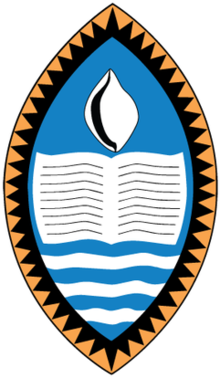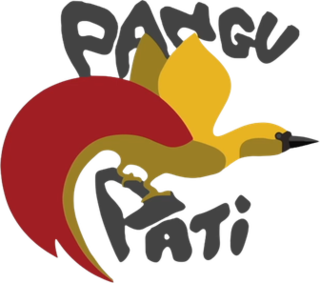
The Pangu Pati, officially Papua na Niugini Yunion Pati, is a nationalist and developmentalist political party on the centre-left in Papua New Guinea. The party is the oldest political party in Papua New Guinea and has held all levels of government throughout its history. As of 2023, it is the largest party in the National Parliament.
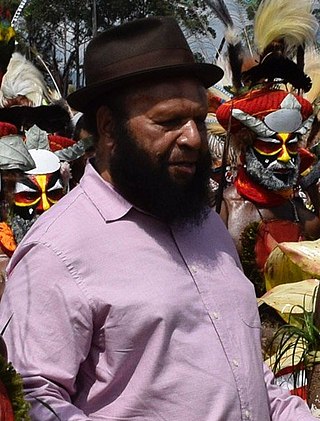
Paias Wingti is a Papua New Guinean politician. He served as the third prime minister of Papua New Guinea between 1985 and 1988, and again from 1992 to 1994.
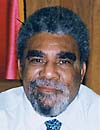
Sir Mekere Morauta was a Papua New Guinean politician and economist who served as the 7th Prime Minister of Papua New Guinea from 1999 to 2002. Inheriting a depressed economy and a fractious legislature, he embarked on fundamental reforms of the country's economy and political system.

Sir Michael Thomas Somare was a Papua New Guinean politician. Widely called the "father of the nation", he was the first Prime Minister after independence. At the time of his death, Somare was also the longest-serving prime minister, having been in office for 17 years over three separate terms: from 1975 to 1980; from 1982 to 1985; and from 2002 to 2011. His political career spanned from 1968 until his retirement in 2017. Besides serving as PM, he was minister of foreign affairs, leader of the opposition and governor of East Sepik Province.

Dame Carol Anne Kidu, also known as Carol, Lady Kidu, is an Australian-born Papua New Guinean politician.
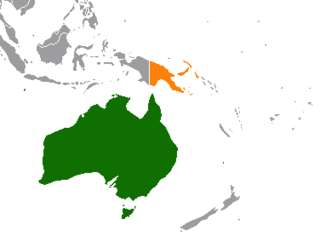
Foreign relations exist between Australia and Papua New Guinea. Papua New Guinea is Australia's closest neighbour and a former colony of Australia. Both nations share the same continent in the Oceania region. Papua New Guinea has developed much closer relations with Australia than with Indonesia, the only country with which it shares a land border. The two countries are Commonwealth realms. In contemporary times, Papua New Guinea is one of the largest recipients of Australian aid. Some critics have pointed to instances where this has led to an outsized Australian influence on Papua New Guinea politics.

The monarchy of Papua New Guinea is a system of government in which a hereditary monarch is the sovereign and head of state of Papua New Guinea. The current Papua New Guinean monarch and head of state, since 8 September 2022, is King Charles III. As sovereign, he is the personal embodiment of the Papua New Guinean Crown. Although the person of the sovereign is equally shared with 14 other independent countries within the Commonwealth of Nations, each country's monarchy is separate and legally distinct. As a result, the current monarch is officially titled King of Papua New Guinea and, in this capacity, he and other members of the royal family undertake public and private functions domestically and abroad as representatives of Papua New Guinea. However, the King is the only member of the royal family with any constitutional role.
Sir Albert Maori Kiki was a Papua New Guinean politician. He was a leading activist for independence and was one of the founders of the Pangu Party. He served as Papua New Guinea's first deputy prime minister from 1975 to 1977 under Michael Somare.
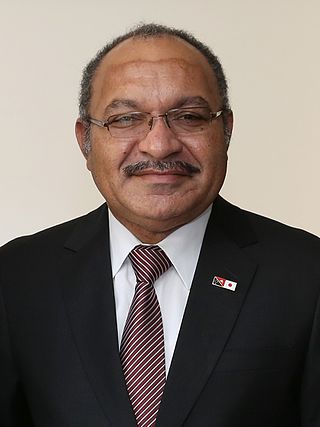
Peter Charles Paire O'Neill is a Papua New Guinean politician who served as the seventh Prime Minister of Papua New Guinea from 2011 to 2019. He has been a Member of Parliament for Ialibu-Pangia since 2002. He was a former cabinet minister and the leader of the People's National Congress between 2006 and 2022. He resigned his position as prime minister to avoid a vote of no confidence, and he was succeeded by James Marape. O'Neill won re-election to the National Parliament of Papua New Guinea in 2022 in the first round with a large majority, which is unusual in the country.
2011–2012 Papua New Guinean constitutional crisis was a dispute between Sir Michael Somare and Peter O'Neill. Both claimed to be Prime Minister of Papua New Guinea.

The Development Policy Centre (Devpol) is an aid and development policy think tank based at the Crawford School of Public Policy in the College of Asia and the Pacific at the Australian National University. Devpol undertakes independent research and promotes practical initiatives to improve the effectiveness of Australian aid, to support the development of Papua New Guinea and the Pacific Islands region, and to contribute to better global development policy.
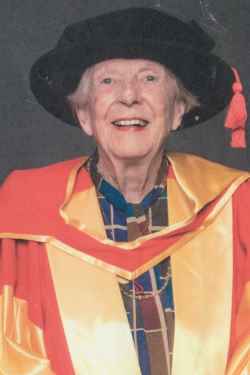
Ellen Maev O'Collins, MBE was an Australian social worker by training, who became Emeritus Professor in the Department of Anthropology and Sociology at the University of Papua New Guinea.
Betty Lovai, from Papua New Guinea (PNG), is a professor and the executive dean of the School of Humanities and Social Sciences at the University of Papua New Guinea (UPNG).
Louise Morauta is an anthropologist and former public servant in Australia. For many years she taught anthropology and sociology at the University of Papua New Guinea (UPNG). She was the first wife of the former prime minister of Papua New Guinea (PNG), Mekere Morauta.

Sir Anthony Siaguru was a Papua New Guinean civil servant, lawyer, international diplomat, politician, sportsman and anti-corruption campaigner.
Sir Charles Lepani is a former public servant and diplomat from Papua New Guinea. He was the country's high commissioner in Australia from 2005 to 2017 and, prior to that, had been its ambassador to both the European Union and several European countries.
Sir Cecil Abel (1903–1994) was a missionary, teacher and politician, initially in the Territory of Papua and, from 1975, in the independent nation of Papua New Guinea (PNG). He played an important role in the independence process and is said to have been responsible for the preamble to PNG's constitution. He also played a leading role in the early stages of the Pangu Party, the party that formed the government under prime minister Michael Somare after independence.

Sir Alkan Tololo was the director of Papua New Guinea's education department and the first Papua New Guinean to be chancellor of both the University of Papua New Guinea (UPNG) and the Papua New Guinea University of Technology (Unitech). He also became chancellor of Vudal University, as well as holding diplomatic posts in Australia and Malaysia.
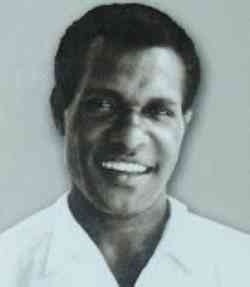
Sir Ebia Olewale (1940–2009) was a politician in Papua New Guinea (PNG). He was elected as a member of the House of Assembly of Papua and New Guinea in 1968 and went on to hold several ministerial positions during the period of self-governance and after PNG's independence in 1975, including that of deputy prime minister. He was knighted in 1983 and served as chancellor of the University of Goroka from 2000 to 2006. From 2002 until his death, he was a director of the Papua New Guinea Sustainable Development Program.
Sogeri National High School is a school situated in Sogeri in the Central Province of Papua New Guinea (PNG). It was the country's first national high school and it educates students from all over the country in Forms 5 and 6, prior to their going on to tertiary education. Many of PNG's leading politicians, administrators, business people and academics have been educated at the school. It was described by the country's first prime minister, Sir Michael Somare, himself a former pupil, as "the school that shaped the nation".
